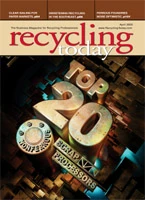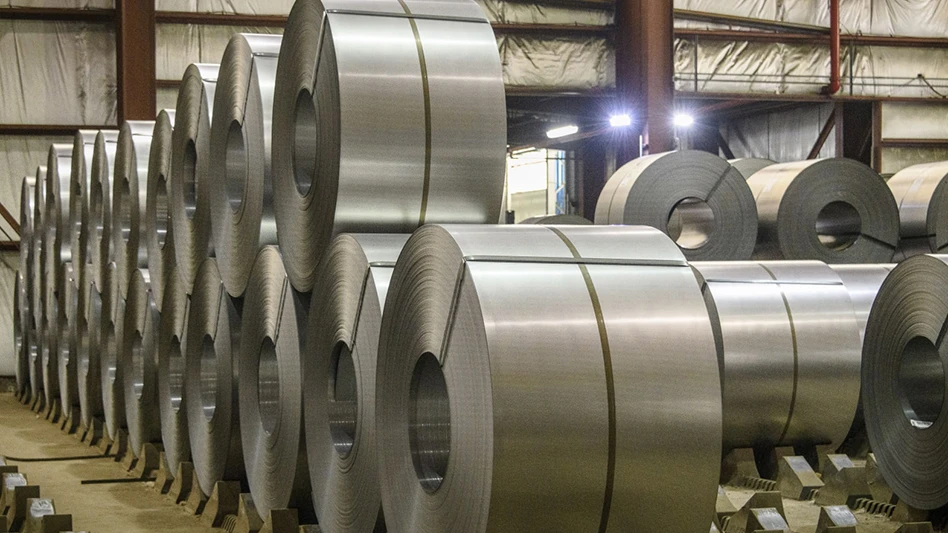NEW REGULATIONS FOR SCRAP SHIPPERS TO CHINA
According to the Bureau of International Recycling (BIR), Brussels, a new Commission Regulation affecting European scrap exporters to China came into effect Feb. 11.
The regulation concerns exports of certain types of Annex II Green List "wastes" under normal commercial rules, adding cotton scrap and yarn scrap to the previous goods allowed.
Meanwhile, all other Annex II "Green list" material not wanted under normal commercial rules, now including GC010 (of certain metals and alloys) and GC020 (of printed circuit boards), become automatically "Red controlled," as do unlisted non-hazardous wastes.
The European Union began implementing the UN-EP Basel Convention Ban, which bans the export of all hazardous wastes from the EU to China, in 1997.
In a note to its members, the BIR states that in light of the EU and OECD (Organization for Economic Cooperation and Development) listing variation from the Basel Convention, China may not ban the import of certain end-of-life goods, those being "Red controlled" instead.
EU CUSTOMS DUTIES LIFTED
The Bureau of International Recycling (BIR) has informed its members that EU customs duties on imports of certain products (including iron and steel scrap, aluminum scrap, recycled textiles and rags) from the United States have been suspended retroactive to the start of this year.
The decision follows a Council Regulation adopted Jan. 31, 2005. Trade sanctions were imposed on the United States in reply to a U.S. law that allowed foreign sales corporations (FSCs) to benefit from export subsidies totaling more than $4 billion yearly since 2000.
The duties will be suspended until Jan. 1, 2006, or 60 days after review by the World Trade Organization (WTO) to determine whether the FSC successor legislation, the American Jobs Creation act, is compatible with WTO rules.
The FSCs were found by the World Trade Organization in 2000 to be a direct subsidy to exports. In May 2003, the EU was authorized by the WTO Dispute Settlement Body to impose countermeasures of up to a level of $4 billion in the form of additional duties of imports of certain products from the United States.
The new EU regulation aims at encouraging the United States to comply fully with WTO rules and to remove the remaining trade distortion created by subsidies granted since the adoption of the FSC Act.
BIR MEMBERS LOOK TOWARD SPAIN
Barcelona is serving as the host city for the 2005 World Recycling Convention & Exhibition hosted by the Bureau of International Recycling (BIR). The event is May 22-25 in Spain’s second largest city.
The Princesa Sofia Hotel is in the heart of Barcelona’s financial and shopping district, allowing attendees to enjoy the sights of Barcelona when they are not in business meetings.
The BIR event begins Sunday, May 23, with several committee meetings. After additional committee meetings early Monday morning, open or plenary sessions start with the Ferrous Division session Monday at 9:30 a.m.
Additional plenary sessions on Monday include those of the Shredder Committee, the Media Metal Separation Committee and the Plastics Committee.
Tuesday, May 25, the plenary sessions of the Stainless Steels & Special Alloys Committee, the Nonferrous Metals Division, the International Environmental Council and a General Assembly session all take place.
The event wraps up Wednesday with plenary sessions for the Textiles Division, the Tires Committee and the Paper Division.
A number of social events and optional sightseeing opportunities also are available to attendees and their guests. The Monday Welcome Reception is at the Palau Reial de Pedralbes, a classical style mansion built in the 1920s for King Alonso XII.
Optional sightseeing tours include an overall Barcelona city tour, a trip to the Salvador Dali Museum and a visit to the Montserrat monastery and winery.
Delegates to the BIR Convention have much to discuss, as global markets have remained lucrative for most secondary commodities throughout the past several months.
Scrap recyclers who provide regional reports to the BIR’s "World Mirror" newsletters report healthy global trading activity, with ferrous scrap demand being driven by hungry consumes in East Asia.
As with ferrous scrap, red metal scrap demand is being led by hungry consumers in China. Pricing remains strong by historic standards, and the trading of red metal scrap between North America, Europe and Asia has reached new volume records.
Conditions for aluminum remain more muted, BIR delegate Thierry Cochet of France’s Europenne des Metaux says. Supply is more evenly matching demand, meaning aluminum pricing has been less volatile.

Explore the April 2005 Issue
Check out more from this issue and find your next story to read.
Latest from Recycling Today
- Fitch Ratings sees reasons for steel optimism in 2025
- P+PB adds new board members
- BlueScope, BHP & Rio Tinto select site for electric smelting furnace pilot plant
- Magnomer joins Canada Plastics Pact
- Out of touch with reality
- Electra names new CFO
- WM of Pennsylvania awarded RNG vehicle funding
- Nucor receives West Virginia funding assist





